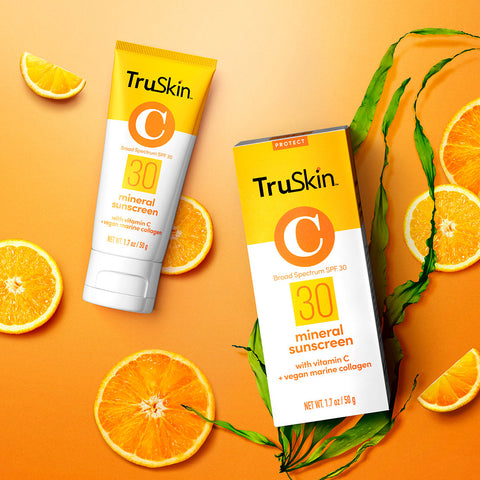
What Happens To Your Skin During Menopause?
Menopausal skin can be anything from slightly tricky to downright terrible. But wayward hormones needn’t get the better off you. You just need to know what to expect and get ahead of the game.
How times have changed. Rewind ten, maybe just five years ago and the ‘m’ word was never spoken about. This important life-changing period of time that happens to every single woman alive, literally brushed under the carpet as if it were some dirty secret. Total madness.
Thankfully, we live in different times and the menopause (there, we said it!) is now a topic we can openly talk about without feeling ashamed or, heaven’s forbid, old. Because it’s an important time and can bring a lot of unsettling uncertainties to any woman going through this perfectly natural stage of life. Hot flashes, weight gain, mood swings, zero energy, they can all go hand in hand with the menopause.
And then there’s your skin which also has its own challenges to contend with.
How The Menopause Affects Your Skin
The menopause can be split into three stages. Perimenopause begins first, usually in a woman’s 40s (although it can start as early as your 30s and as late as your 50s). This period of your life refers to the time in which your body starts to transition out of your reproductive years and into the menopause. Your body’s production of hormones (mainly estrogen and progesterone, but also testosterone to a certain degree) starts to decline, your periods become irregular and a few of the classic side effects may come to fruition. Fun times!
Then you obviously get the menopause which is when your body’s hormones cause you to completely stop menstruating (which can take many years) and all those fabulous (said with a side of irony) side-effects get stronger and more frequent. More fun times. Once menopause is over and you’ve stopped ovulating for a year you’re then said to be in the postmenopause and will be forever more.
As you progress through these different stages, your hormones are all over the place which is never great news for the health of your skin. You see, hormone fluctuations can affect your levels of sebum (cue dryness). Not only that but they upset your collagen production which is already declining as part of the natural aging process (cue wrinkles and sagging skin). Estrogen is also important for helping your skin to retain water so when these levels decrease your skin can’t hydrate itself as efficiently (cue dehydration).
Of course, changes in your skin depend on your skin type but, no matter what, you can inevitably look forward to some kind of ‘unpredictability’ during the menopausal years of your life.
5 Ways To Care For Menopausal Skin
If you’ve started to notice that your skin is misbehaving a little more than it used to, chances are you’re in the stage of your life in which your hormones have become, shall we say, less reliable. Read on for a few effective ways to help keep your skin in check as your hormones are very much not!
1. Be Kind
The most important thing to remember? Don’t panic. Freaking out and overcompensating for dry skin, dehydration, breakouts or wrinkles that were never before is a sure-fire way to irritate your skin. Instead, be gentle with your skin, cleansing, toning and treating it with kindness and respect. Most importantly, avoid ingredients like synthetic fragrances and harsh alcohols that will strip your skin and generate further problems you didn’t sign up for.
A great way to do this? Switch out your regular cleanser for Soothing Cleansing Milk which is perfect for menopausal skin, nurturing and calming your barrier function while bringing vital hydration and even a little exfoliation to the table.
2. Moisturize To The Max
Research shows that the most common skin complaint during the menopause is dry, irritated, and often itchy skin. This is all thanks to lowering levels of estrogen (an important skin hydrator) as well as reduced sebum. Without both of these important moisturizing tools, water is able to escape more easily from the surface of your skin which leads to dryness, dehydration and everything that comes with it.
To help get ahead of this, you’re going to want to introduce a hydrating serum as well as a really good moisturizer into your daily regime. Try the kick-ass combo of our Multi-Vitamin Facial Serum and Renewing Longevity Moisturizing Cream every morning, and Vitamin C Deep Hydration Night Cream before bed.
3. Use Smart Skincare Ingredients To Control Breakouts
Cell turnover becomes super sluggish during this time in your life which gives dead skin cells a free ticket to hang around at the surface of your skin and make your complexion look kind of dull. When it’s combined with wayward hormones it’s also asking for acne breakouts to do a real number on your skin. For most people these are mild and easily managed with healing, anti-inflammatory skincare ingredients like salicylic acid, niacinamide and tea tree oil – well, hello there Tea Tree Face Wash and Tea Tree Super Serum+.
If you feel like yours are more serious and out of control, however, seek help from a dermatologist.
4. Look After Your Collagen
It’s thought that skin loses a massive 30 percent of its natural collagen levels during the first five years of the menopause. Sound like a lot, right? Yeah, that’s because it is. And collagen is extremely important for the strength, firmness and elasticity of your skin so you’ve got to do everything you can to keep it healthy and plentiful.
How to do this? With a healthy diet, good sleep, marginal stress (preferably none at all, but it’s OK, we’re all human) and some smart skincare choices. Namely retinol at night (is there anything retinol isn’t good for?!), alongside our fabulous Collagen range which includes Smoothing Collagen Serum, Firming Collagen Day Lotion and our Collagen Boosting Skin Supplement which contains vegetarian collagen (none of that animal stuff for us, thanks) alongside skin-strengthening vitamins, biotin and acai.
5. Apply SPF Like Your Skin Depends On It
Because, heads up, it actually does. Dark spots are likely to get darker, bigger and more prevalent during your menopausal years as decades of sun exposure combine with wild hormones, causing your melanin to lose control of itself. Your fine lines and wrinkles are equally likely to suffer thanks to a lack of collagen helping to reinforce the strength and plumpness of your skin. Sigh.
Our advice? Don’t leave the house without applying SPF 30 Mineral Sunscreen with Vitamin C to your face and neck. It’s packed with sun-protective zinc oxide as well as aloe vera to hydrate and nourish your skin and a TruSkin favorite, brightening vitamin C. It’s basically a skincare must. Every. Day. Of. The Year.













